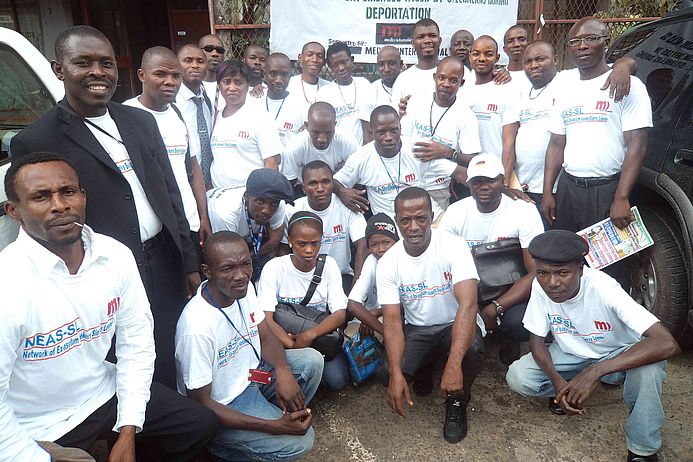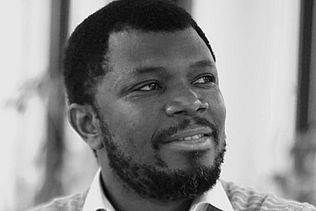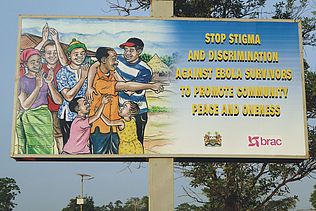By Julius Buecher and Ramona Lenz.
For many years, medico has been providing support in the area of flight and migration to partner organisations which organise humanitarian emergency aid, medical care and psychological services, and defend the rights of refugees and migrants. Often, this involved organisations of the people affected. This is the case, for example, with the “Network of Ex-Asylum Seekers” (NEAS) in Sierra Leone, an organisation which was formed by deported returnees as a self-help structure. The common basis for the activities of NEAS is the experience of deportation from Germany and the difficult situation after their involuntary return to Sierra Leone.
In meetings in 2011 between medico staff and NEAS representatives the latter reported on the serious psychosocial consequences of their deportation to a society which was ignorant of the reasons for their deportation and stigmatised them as failed migrants or even as criminals. The core concerns of NEAS are accordingly public education on migration and deportation policies, psychosocial strengthening of the deported and defence of their rights. “It’s worth reflecting on the history of cooperation with what was initially a chaotic and unstable self-help group,” says Tejan Lamboi, who has been a consultant to both organisations since the start of cooperation. Looking back, he comments: “When medico began to support the group, it was still very disorganised. The members of NEAS were very glad of this cooperation, which they regarded as unique and unusual.” In 2017 there was a need on both sides to step back and reflect on the work to date. medico made it clear in advance that the cooperation will continue. This declaration of confidence in the collaboration was important to avoid the inevitably unequal position of the donor and recipient organisations imparing the reflection process.
Questions and results
At the start of the reflection phase, Tejan Lamboi held a workshop with the members of NEAS. The result was a report documenting the central strategic issues for the further development of NEAS and expectations relating to future cooperation with medico. With this as a basis it was possible for the responsible colleagues at medico to address the questions and needs of NEAS directly on their subsequent visits to Sierra Leone, and continue and focus the lines of discussion in further workshops and meetings.
One central question worrying NEAS members was whether the organisation should consolidate, i.e. settle on their current way of working, or try to continue growing, which would mean NEAS expanding their activities in the area of direct aid to other deportees. At this point NEAS was facing a dilemma which affects many civil society actors in the area of migration. “Organisations which try to cushion the humanitarian crisis resulting from involuntary return frequently run the risk of becoming humanitarian agents of a deportation and return practice which they actually reject,” notes Sabine Eckart, at medico responsible for not only migration but also evaluation. “The important thing here is to be constantly aware of this dilemma, review exactly which stakeholders you are cooperating with at which level, and try to prevent growing dependencies and also reduce existing dependencies as far as possible.” The joint reflection process with NEAS has also raised central questions for medico, which constantly recur. Working with partners like NEAS which operate in extremely fragile situations involves a special responsibility for medico. The economic circumstances of the partners also influence their possibilities for being politically involved in the long term.
Solidarity-based aid enters the struggle
The fact that NEAS is a self-help organisation and the expertise of NEAS members is based on their own experience of deportation results in further challenges. Selfhelp organisations are generally formed on the basis of a key experience shared by the members. Supporting their important self-empowerment processes while at the same time avoiding contributing to the perpetuation of stories of victimhood is a challenge which medico faces constantly. “ The most important aspect was for the selfhelp groups to enable their members to see themselves again as actors and stakeholders, and not as traumatised objects of exclusion and despotism,” explains Usche Merk , medico senior desk officer for psychosocial work , who supported NEAS from the start as project coordinator. One result of the participative reflection process is that medico plans to focus more on the organisational development of NEAS in future, in that it simultaneously qualifies members for economic prospects outside the organisation.
Solidarity-based aid, as medico understands it, ventures into areas distinguished by differing interests and asymmetries of power, which make it impossible for actions to be free from contradictions. Nevertheless, we try as far as possible to work as equal partners in achieving joint goals. In the process of cooperation, we learn from each other and change. Phases of reflection make it possible to strengthen the partnership and continue the joint work on a new basis. This also applies to the NEAS, which we will continue to support in its struggle for the rights of deportees to go their own way.



